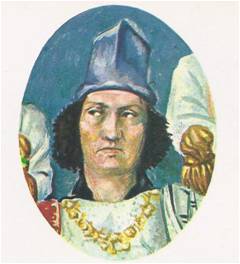WHEN MORE than a century of war between England and France ended in 1453, it was the French king, Charles VII, who was victorious. Although he had driven the English out of France, Charles found himself the king of a sad land. During the wars the great French nobles had fought among themselves as bitterly as they had fought the English and they had become so powerful that they no longer respected their king. France itself was devastated, the people poor and hungry. Paris had been half ruined. Wolves prowled the city by night and twenty-four thousand houses stood empty. Charles worked hard to restore order, setting aside special hours each day for special problems. He organized a permanent army to make himself independent of the nobles, but he found the nobles had no intention of letting him be independent. Many of them rebelled and his own son Louis joined them. Charles died in 1461 and Louis became king — and before long Louis, too, had trouble with the nobles. One great duke, Charles the Bold of Burgundy, even imprisoned Louis in a castle until the king promised to satisfy all the nobles’ demands. After he was freed, however, Louis broke all his promises. He was astoundingly lucky; one by one his greatest rivals died and he inherited their lands. As he gathered in more lands and more power, Frenchmen grew to fear him. They called him the Spider King. Louis’ successors turned to fighting wars in Europe to win new glory for France. Francis I was so successful that he even hoped to be elected the next ruler of the great Holy Roman Empire. He did his best to buy up the votes of the princely electors, but all his gold could not match the riches of the powerful …
Read More »England under the Tudors 1485-1603
IN AUGUST of 1485, Henry Tudor landed on the Welsh coast to fight King Richard III for the crown of England. Henry was twenty-nine years old, lean and golden-haired, with a merry face. He was head of the Lancaster family, which had so far been defeated by King Richard’s family, York, in the Wars of the Roses. Henry was counting on help from many Englishmen and Welshmen who hated Richard. They believed Richard had hacked his way to the throne by murdering his nephews, they resented his taxes and rich living and they called him the “great hog” or “great boar.” Many Welshmen immediately joined the Lancaster chief, hopefully shouting, “King Henry! King Henry!” and “Down with the bragging white boar!” Henry marched north into England, gathering new followers. Richard mocked Henry’s troops as a few “faint hearted Frenchmen and beggarly Britons.” Even so, he raised a large army and advanced to Bosworth Field near Henry’s camp. When Richard roused his troops for battle on the morning of August 21, they stretched out, as a chronicler said, “a wonderful length,” so that the sight of the massed footmen and horsemen sent a thrill of horror through Henry’s camp. On a knoll overlooking the countryside, Henry stirred his men to fight. He told them not to be dismayed by Richard’s large army. Painting to Richard’s camp, he said that there was a thief who had stolen the crown and now must surely fail. Against “yonder tyrant” his soldiers must advance “like true men against traitors . . . scourges of God against tyrants.” Then Henry led his men to the attack. They marched with the archers in the centre and the foot soldiers on the right protected by a marshy bog. They advanced so that the sun was behind them and …
Read More »

